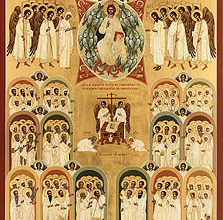St. Glyceria Orthodox Saint History and Name Day Information
Comments Off on St. Glyceria Orthodox Saint History and Name Day Information
 In the Orthodox Church, we regularly celebrate the lives of all the saints. During each calendar year, each saint has his or her own feast day. Christians are also often named after a saint, and those who are will celebrate their name day on the saint’s feast day. Some even celebrate their name days instead of their own birthdays!
In the Orthodox Church, we regularly celebrate the lives of all the saints. During each calendar year, each saint has his or her own feast day. Christians are also often named after a saint, and those who are will celebrate their name day on the saint’s feast day. Some even celebrate their name days instead of their own birthdays!
Saint Glyceria is one of the saints that we recognize. Hear feast day is on May 13th of each year. Here’s more information about her history, who she was, and why she is recognized as a saint:
About Saint Glyceria
Saint Glyceria, also known as Saint Glykeria or The Holy Martyr Glyceria (Glykeria) is known for having been a virgin martyr. Not much is known about her life in general, but we do know that she lived in Rome during a time when Christians were actively persecuted. The accepted religion of the Romans at the time was the old pagan, polytheistic ones that involved worshipping gods such as Jupiter (Zeus) and the others in the Roman pantheon. Those who didn’t have these beliefs were persecuted and often martyred.
Glyceria is one of those who was persecuted for her Christian faith. In 141 AD, she went to a temple in Trajanopolis, which was in Thrace, during a well known pagan festival. She entered a temple and declared that she was a handmaid of Christ. During this festival, Sabine, the governor of Thrace, was offering sacrifices at the temple. When he heard what Glyceria did, he commanded her to make a sacrifice to the god, Jupiter (Zeus). Instead, she knocked the statue of the god down and stood firm in her Christianity. As a result of her actions, she was tortured and cast out to the wild animals.
Hymns of Saint Glyceria
Saint Glyceria’s feast day is held on May 13th of each year. During her feast day, we sing or chant hymns in her honor. Here’s a look at the words of the hymns after they have been translated into English. There are versions of these hymns in other languages too, such as Greek:
Apolytikion of Martyr Glyceria – Fourth Tone
O Lord Jesus, unto Thee Thy lamb doth cry with a great voice: O my Bridegroom, Thee I love; and seeking Thee, I now contest, and with Thy baptism am crucified and buried. I suffer for Thy sake, that I may reign with Thee; for Thy sake I die, that I may live in Thee: accept me offered out of longing to Thee as a spotless sacrifice. Lord, save our souls through her intercessions, since Thou art great in mercy.
Kontakion of Martyr Glyceria – Third Tone
Loving Mary ardently, the Theotokos and Virgin, thou didst keep thy maidenhood all uncorrupted and spotless; smitten in thy heart with longing for thy divine Lord, thou didst strive even to death with courageous valour. O Glyceria, for this cause, Christ God doth crown thee with an august twofold crown.
Saint Glyceria is widely recognized as a saint in the Orthodox Christian Church. Her name day is on May 13th of each year. Check the Name Day page for more information about other Orthodox Christian name days.
Source:
The Holy Martyr Glyceria – Also Image Source
Categorized in: Greek Orthodox Religious Information
This post was written by Greek Boston
Share this Article:





